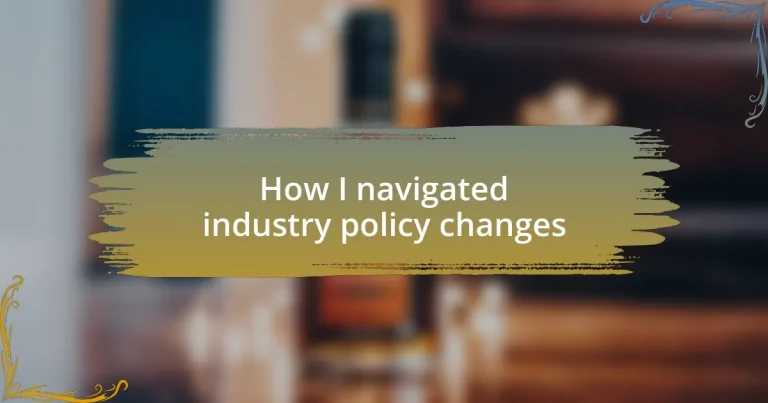Key takeaways:
- Staying informed through industry conferences and community engagement is essential for adapting to policy changes in alcohol regulations.
- The shift towards stricter advertising guidelines and transparency in labeling presents challenges and opportunities for brands to connect with consumers.
- Collaborative brainstorming can foster innovation and creativity in response to regulatory pressures, leading to successful marketing strategies.
- Continuous education and proactive learning about industry trends empower professionals to navigate the complexities of evolving regulations.
Author: Clara Whitmore
Bio: Clara Whitmore is an acclaimed author and storyteller known for her captivating narratives and richly drawn characters. Her work spans several genres, including contemporary fiction and historical romance, often weaving elements of personal experience into her writing. Clara holds a Master’s degree in Creative Writing from the University of Edinburgh and has published three novels, which have garnered critical acclaim and a loyal readership. When she’s not writing, Clara enjoys exploring quaint bookstores and hosting literary workshops. She currently resides in Portland, Oregon, with her dog, Jasper.
Understanding industry policy changes
Understanding industry policy changes can feel overwhelming, especially when you’re deeply passionate about the subject. I remember first encountering a sudden shift in regulations regarding alcohol advertising; it was like a curveball that forced me to rethink my approach. How do we adapt and thrive in such a volatile environment?
As I navigated those choppy waters, I quickly realized that staying informed isn’t just beneficial—it’s essential. The idea of attending industry conferences became compelling to me; those moments of networking and learning from experts opened my eyes to the nuances of policy implications that I hadn’t previously considered. Did I really want to risk falling behind simply because I wasn’t paying attention?
Moreover, engaging with fellow enthusiasts helped me process these changes emotionally. I found solace in discussions with peers who shared similar concerns. How often do we overlook the importance of community in understanding complex policy changes? Together, we analyzed the ramifications and devised strategies, making the entire experience a transformative journey rather than a daunting challenge.
Key trends in alcohol regulations
Key trends in alcohol regulations have shown a notable shift towards stricter advertising guidelines. I remember feeling unsettled when research revealed that many jurisdictions were tightening the reins on targeted marketing, particularly to younger audiences. It raised a compelling question for me: How do brands ensure they remain relevant without crossing ethical boundaries?
Another significant trend I’ve observed is the increasing movement toward transparency in labeling. It struck me how consumers today want to know exactly what they’re consuming, from ingredients to sourcing information. This push for clarity left me pondering—are we witnessing the dawn of a more informed consumer base that demands accountability from producers?
Finally, local governments have begun to experiment with emerging technologies in monitoring alcohol sales and production. Reflecting on this, I often wonder how these technological advancements could reshape not only compliance but also engagement with consumers. Does this mean that our relationship with alcohol will become more interactive, and will brands need to adapt their strategies to foster a responsible drinking culture?
Challenges faced during changes
Adjusting to industry policy changes in alcohol regulations has not been a smooth journey. I remember the anxiety that accompanied navigating the complexities of new advertising guidelines. Suddenly, promotional strategies I had relied on felt precarious. It left me questioning: How can I adapt my marketing approach without alienating potential customers?
The push for transparency in labeling brought its own set of challenges. I often found myself engaged in lengthy discussions with producers about how to balance revealing too much and ensuring compliance. There were moments when I felt overwhelmed by the idea that every ingredient must be scrutinized, prompting me to ask myself: Are we risking creativity in the pursuit of regulatory correctness?
Embracing technological changes felt daunting as well. I recall the initial confusion surrounding the adoption of new systems for monitoring sales. I wondered if the added pressure of compliance could stifle innovation among smaller brands. At that moment, I realized it was crucial to foster an environment where collaboration outweighed fear, encouraging everyone to find creative solutions within these changing regulations.
Insights gained from my experiences
Reflecting on my journey, I’ve discovered that adaptability is key. For instance, during one particularly overwhelming regulatory shift, I partnered with a small local distillery. We held collaborative brainstorming sessions that not only eased our anxiety but also sparked innovative marketing ideas that resonated with our audience. This taught me that sometimes, the best insights come from sharing the burden with others and harnessing collective creativity.
I also learned that embracing change can lead to unexpected opportunities. When I first tackled the stringent transparency requirements, I was apprehensive about how customers would react. To my surprise, they appreciated our honesty, and sales actually increased as we built trust with our audience. It raises an interesting question: Could vulnerability in our approach be the secret ingredient to fostering deeper connections?
Further along my path, I encountered the importance of continuous education in this ever-evolving field. I made it a point to attend workshops and webinars focusing on industry trends and changes. This proactive stance not only enhanced my understanding but also reassured colleagues who felt lost in the complexity of regulations. It reinforced my belief that knowledge truly is power, especially in a landscape as fluid as ours.


